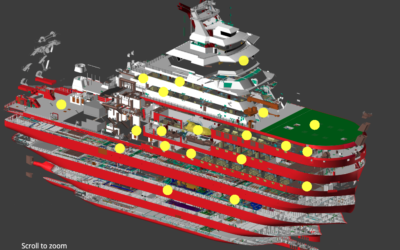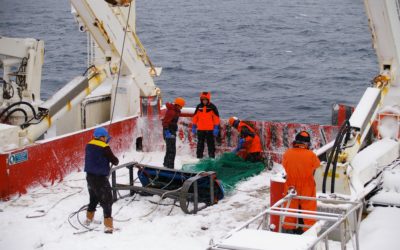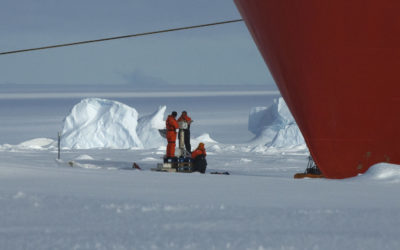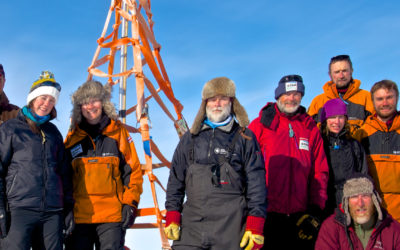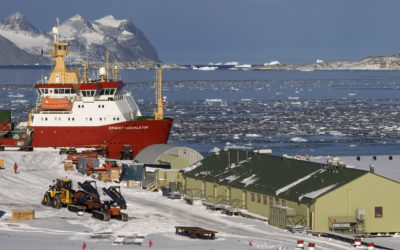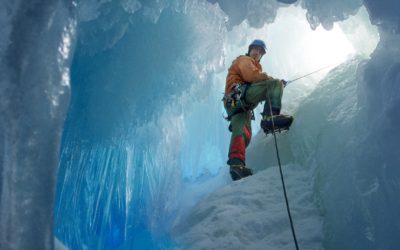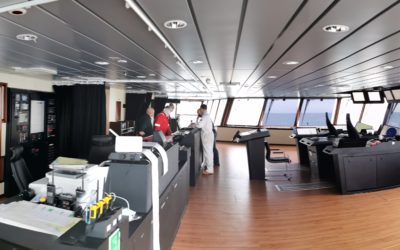
Operational facilities – RRS Sir David Attenborough
Boats, cargo, helideck and hangar
The RRS Sir David Attenborough is one of the most advanced polar research vessels in the world.
Want to know what RRS Sir David Attenborough is up to this season? Check out our ‘Science this season’ page for latest updates from Antarctica.
This multidisciplinary research platform is transforming how ship-borne science is conducted in the polar regions and provides scientists with state-of-the-art facilities to research the oceans, seafloor, ice and atmosphere.
The new polar ship was commissioned by NERC, built by Cammell Laird for operation by British Antarctic Survey. The commissioning of the RRS Sir David Attenborough was part of a major Government investment in polar infrastructure which will keep Britain at the forefront of world-leading research in Antarctica and the Arctic. This £200m commitment represents the UK Government‘s largest investment in polar science since the 1980s.
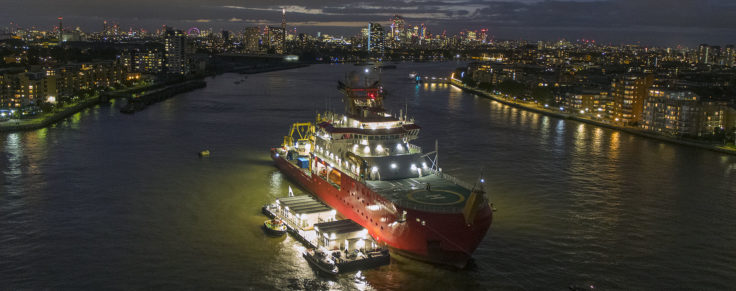
Explore the ship’s scientific facilities and operational capability
Britain has been a world leader in polar exploration and research for over a century. Today, studying these remote regions is crucial in helping us understand changes in our planet’s oceans, marine life and climate system.
RRS Sir David Attenborough is designed to support science in extreme environments. A wide range of specialist scientific facilities, instruments and laboratories enable scientists to conduct multi-disciplinary sciences to study the ocean, seafloor, ice and atmosphere. Marine robotics and remotely operated vehicles – including the famous Boaty McBoatface – capture data from the deep ocean and previously inaccessible locations under the ice.
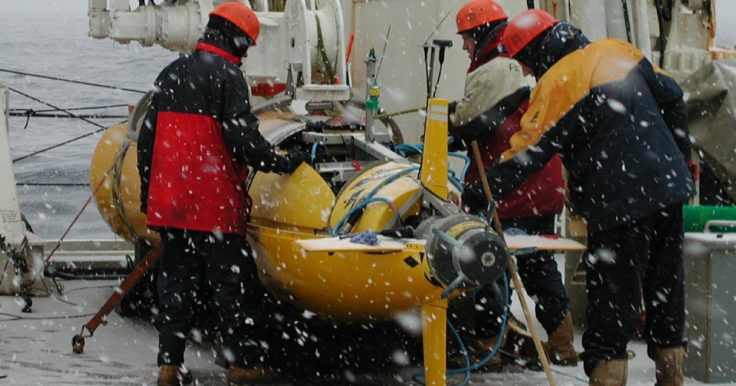
From the ship, scientists can deploy, operate and control a range of remotely piloted science instruments at the same time, meaning they can gather measurements from both airborne and marine remotely operated vehicles and autonomous platforms simultaneously.
She is also the first British polar research ship to feature a moon pool – a vertical shaft (~4 x 4 m) running through the vessel, open to both the air and sea. Using the moon pool, scientific equipment can be deployed and recovered through the centre, and most stable part, of the hull. This is easier and safer than deploying equipment over the side or stern, particularly in the polar oceans’ rough seas.
The ship has a number of built-in laboratories. However, it’s also possible to ‘plug-in’ portable, containerised laboratories. This makes science on board the RRS Sir David Attenborough much more flexible and, as technologies and techniques change, the containers can be reconfigured to ensure research teams have the facilities they need to conduct world-leading science.
The new polar ship for Britain operates year-round, spending the northern summer supporting Arctic research cruises and the austral summer in Antarctica carrying out research programmes and bringing people and supplies to BAS research stations.
Her ice-strengthened hull, designed to break through ice up to one metre thick, and ability to spend up to 60 days at sea means the RRS Sir David Attenborough can undertake extensive voyages. The ship’s operational facilities will enable her to undertake logistics work efficiently, maximising the time spent on research cruises.

Watch a tour of the RRS Sir David Attenborough:
RRS Sir David Attenborough provides UK polar researchers and their international collaborators with a state-of-the-art multi-disciplinary research platform to study the ocean, seafloor, ice and atmosphere.
It’s critical that we understand the role that the polar oceans play in our changing world. The Southern Ocean in particular has the sparsest data coverage of any of the world’s major oceans due to its remoteness and inhospitable nature. RRS Sir David Attenborough plays an important role in improving our knowledge of key polar atmospheric and oceanic processes, which regulate our climate. She is also enhancing our knowledge of the Southern Ocean ecosystem, essential for conserving and managing Antarctica’s species and biological resources.
International studies focusing on the changing Arctic are also being enhanced by this new facility. The ship enables scientists to investigate the impact that physical and biological changes in the Arctic environment will have on Arctic and non-Arctic countries alike.
At both poles, researchers can carry out marine geophysical and geological investigations to map and date glacial landforms and sediments on the seafloor to reconstruct past environments. This is fundamental for helping predict how the polar regions may respond to future climate change and contribute to global sea-level rise.
Dep Science Leader of Palaeo Environments IMP 3
BAS-Arctic Working Group, Palaeo Environments, Ice Sheets and Climate Change team

Boats, cargo, helideck and hangar
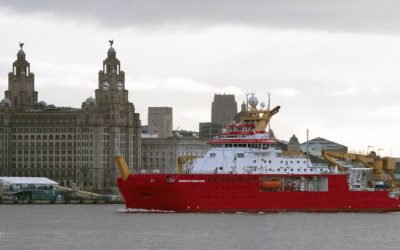
There is no excerpt because this is a protected post.
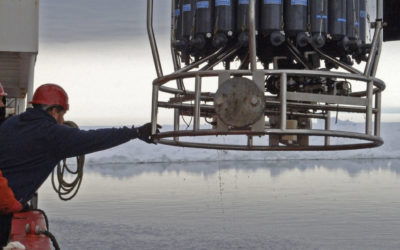
Scientific facilities and capability
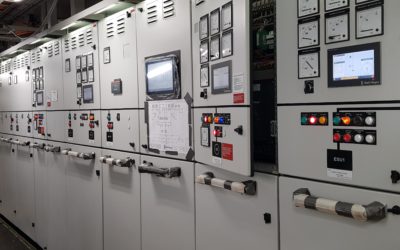
The Polar Code and green technologies
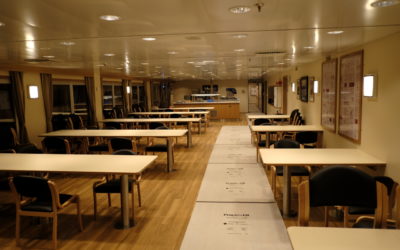
Accommodation, dining, medical and recreation
17 April, 2025 by Jamie Oliver
Antarctica, January 2025. Three expert teams are making their way across the stark frozen landscape, by sea, land and air – and they are planning to meet. Jamie Oliver shares …
30 December, 2023 by Emily Newton
Every year at British Antarctic Survey is a huge team effort. What we do couldn’t happen without every one our talented staff – whether they are doing the legwork of …
4 October, 2023 by Ralph Stevens
Traditionally when working in a remote environment, we fall back on wood and glue to repair and modify parts onboard the RRS Sir David Attenborough. Quite often, the plastic components …
18 May, 2023 by Emily Neville
Today, 18 May, is the IMO International Day of Women in Maritime – a day to celebrate and raise the profile of women who work at sea. Here at British …
9 May, 2023 by Emily Neville
This weekend, BAS staff in Antarctica and on board RRS Sir David Attenborough celebrated the Coronation of King Charles III. On the RRS Sir David Attenborough RRS Sir David Attenborough spent the …
3 May, 2023 by Kate Hendry
The polar science trials cruise is over, everyone has travelled home (or are off on their next adventure), and now it’s time to reflect on a successful expedition. Thanks to …
21 March, 2023 by Huw Griffiths
We are marine biologists that study seafloor creatures, Jamie is doing a PhD investigating Antarctic sea spiders in the University of Galway and Huw works at BAS. Both of us …
22 February, 2023 by Emily Newton
Last week, the team aboard the RRS Sir David Attenborough produced the first significant scientific data set with the ship’s oceanography equipment – a significant milestone in the life of …
3 December, 2022 by David Wilkins
David Wilkins is the Net Zero Engagement and Support Officer at British Antarctic Survey. He recently visited our new polar ship, RRS Sir David Attenborough. On this International Day of …
5 July, 2022 by Jonathan Smith
Reaching net zero, as a country or a business, requires new measures, technology and innovations. Digital twins are an example of this; they can be a powerful tool to drive innovation and efficiency.
16 May, 2022 by Emily Neville
Britain’s new polar ship, RRS Sir David Attenborough, has reached another exciting milestone, completing its first ever scientific assignment – retrieving a scientific mooring! RRS Sir David Attenborough is currently …
21 December, 2021 by Christopher Robert Lloyd
Christopher Robert Lloyd, Contract Manager for Ramboll, will be working in Antarctica on constructing the new scientific support facility at Rothera, the Discovery Building. He first travelled to Antarctica in …
21 December, 2021 by Emily Neville
It’s been a busy few weeks for RRS Sir David Attenborough! After departing the UK on its maiden voyage over a month ago, the ship has made it all the …
16 July, 2021 by Emily Neville
At British Antarctic Survey, the next chapter in shipborne research is about to begin. Britain’s new polar ship, the RRS Sir David Attenborough, has been undergoing an intensive programme of …
19 May, 2021 by David Barnes
This week at Climate Exp0, Dr David Barnes, benthic marine Ecologist at British Antarctic Survey, has discussed the potential for mitigating climate change through nature-based solutions, including sharing collaborative research …
10 March, 2021 by Emily Neville
Last month, the RRS Sir David Attenborough carried out two weeks of sea trials around the UK. We caught up with Captain Will Whatley to find out how it feels to be …
21 October, 2020 by Nigel Bird
Guest Blog. UKRI-NERC’s Nigel Bird reflects on the highs and lows of the commission of RRS Sir David Attenborough.
8 November, 2018 by Michael Gloistein
Ship Communication Officer tells us how the crew are preparing for their roles on board
13 June, 2018 by Michael Gloistein
Ship Communication Officer checks out construction progress
20 April, 2017 by Paul Fox
Paul Fox, Senior Responsible Officer for RRS Sir David Attenborough, has written a guest blog for a behind-the-scenes look at NERC’s commission of a new polar research ship for Britain and the associated Antarctic infrastructure modernisation programme.
12 December, 2025
Researchers, engineers and support staff at British Antarctic Survey’s (BAS) five UK research stations and aboard the UK’s polar research ship RRS Sir David Attenborough mark the festive season at …
16 October, 2025
RRS Sir David Attenborough departs from Plymouth on 17 October to begin five-week voyage to Antarctica, marking the start of the new Antarctic field season. Cambridge, UK – British Antarctic …
4 July, 2025
A new study in collaboration with BAS scientists reveals for the first time that zooplankton migration contributes significantly to carbon storage in the Southern Ocean – a process currently overlooked …
25 June, 2025
Professor Mike Meredith is an oceanographer at British Antarctic Survey. He concludes a first of its kind science cruise on the RRS Sir David Attenborough conducting research in the polar …
9 May, 2025
British Antarctic Survey scientists and support staff are coming to the end of another successful Antarctic science season. Teams are now preparing for the transition to winter operations as the …
5 February, 2025
Scientists return to the Southern Ocean this week (5 February 2025), as part of the BIOPOLE project, to answer fundamental questions about how nutrients drive the global carbon cycle and …
9 December, 2024
British Antarctic Survey (BAS) staff working on the frozen continent are preparing to celebrate the festive season in style. Nearly 300 researchers, engineers, crew and support staff, located across five …
26 November, 2024
A project looking at how clouds affect climate change in Antarctica starts its second year of field research this month. The Southern Ocean Clouds (SOC) project, which is part of …
15 November, 2024
Today marks the release of The Seventh Continent, a new album from the international Sounds of Space Project that offers a unique aural journey to Antarctica. The album features contributions …
12 September, 2024
Your name will go on a journey to the frozen wilderness! New project seeks to inspire, educate and entertain the public about Antarctica. Do you dream of visiting Antarctica? Well, …
15 July, 2024
This week (Friday 19 July) the UK’s polar research vessel the RRS Sir David Attenborough makes its first science expedition to the Arctic. A team will work in south-east Greenland …
16 May, 2024
The 2023/4 Antarctic field season has wound up and the last of the summer teams are aboard the RRS Sir David Attenborough and heading for home. This season not only …
23 January, 2024
A team of scientists are embarking on an ambitious 30-day scientific expedition on board RRS Sir David Attenborough to investigate how carbon dioxide moves and transforms in the Southern Ocean. …
16 January, 2024
Scientists at British Antarctic Survey are using satellite images to track the colossal iceberg A23a. This new animation shows the recent trajectory of the A23a iceberg as it moves north …
4 December, 2023
ANTARCTICA: Scientists aboard the RRS Sir David Attenborough collected samples of seawater around the A23a mega iceberg, the largest iceberg in the world. New video footage shows the enormous iceberg, …
20 November, 2023
A team of international researchers set sail on the RRS Sir David Attenborough today (20 November) to answer some of the big questions about how Antarctic ecosystems and sea ice …
22 August, 2023
An Autonomous Underwater Vehicle (AUV) was deployed from the RRS Sir David Attenborough (SDA) for the first time last week. The Gavia Offshore Surveyor, named Freya, was deployed from the …
28 July, 2023
Further trials are underway on RRS Sir David Attenborough in preparation for its first Antarctic science cruise. Over the coming weeks, the crew and scientists on board will be carrying …
3 July, 2023
British Antarctic Survey (BAS) is using Hydrotreated Vegetable Oil (HVO) for the first time on the RRS Sir David Attenborough, as an alternative to conventional diesel fuel, as part of …
11 May, 2023
The 2022/23 Antarctic field season has ended, marking the conclusion of another successful year of scientific exploration in one of the world’s most remote and challenging environments. This field season, …
31 January, 2023
The UK’s new polar ship RRS Sir David Attenborough begins its polar science trials in Antarctica this week. A team of 30 national and international scientists, engineers and technical staff …
10 December, 2022
Babcock International’s Rosyth shipyard today has been awarded £45 million to maintain the UK’s fleet of three scientific research vessels – including RRS Sir David Attenborough. The three vessels are …
18 November, 2022
Today (18 November) British Antarctic Survey (BAS) joins global celebrations to mark LGBTQIA+ STEM DAY and Polar Pride Day. Polar Pride is a celebration of the contribution of LGBTQIA+ people in polar research …
17 November, 2022
Britain’s new polar research ship, the RRS Sir David Attenborough, departs the UK next week (Tuesday 22 November) for its second voyage to Antarctica. The ship departs Harwich on 20 …
20 September, 2022
Captain John Harper retires this month after a long and successful career at British Antarctic Survey (BAS). In fact, with an incredible 42 years of service, Captain Harper is the …
23 August, 2022
RRS Sir David Attenborough begins its second leg of science trials this week (22 August 2022). Britain’s new polar ship will depart Belfast today for its second leg of science …
27 June, 2022
British Antarctic Survey (BAS) scientists will investigate critical challenges facing the UK, thanks to new funding from the Natural Environment Research Council (NERC). A £47m investment to several UK research …
14 June, 2022
Britain’s new polar research ship, RRS Sir David Attenborough, returns to the UK today (14 June) after completing its landmark maiden voyage to Antarctica. The ship departed the UK in …
11 June, 2022
Britain’s new polar research ship, RRS Sir David Attenborough, is centre-stage in a new gallery, ‘Poles Apart’, which opened today at the Royal Museums Greenwich National Maritime Museum. The exhibition …
27 May, 2022
The British Antarctic Survey (BAS) field season has finished for another year. RRS Sir David Attenborough departed Rothera Research Station for the final time earlier in May and is …
12 May, 2022
Trinity House Merchant Navy Cadets are joining Britain’s new polar research vessel RRS Sir David Attenborough. Three Cadets will be joining the vessel in the Falkland Islands this week for …
25 April, 2022
RRS Sir David Attenborough stewards Eric Bourne and Stephen Carpenter, tied the knot yesterday (Sunday 24 April) at British Antarctic Survey’s (BAS) Rothera Research Station. It is the first same-sex …
21 April, 2022
The first same-sex wedding in the British Antarctic Territory is due to take place this weekend at the British Antarctic Survey (BAS) Rothera Research Station.
31 March, 2022
The RRS Sir David Attenborough completes ice trials during its maiden voyage to Antarctica – a critical milestone in the commissioning of Britain’s new polar ship. This is the first …
16 February, 2022
British Antarctic Survey has teamed up with the National Oceanography Centre and the University of Glasgow to champion the FindAScienceBerth project, funded by the Natural Environment Research Council. The project …
11 February, 2022
RRS Sir David Attenborough (SDA) has collaborated with the cruise ship Le Commandant Charcot in its efforts to deliver critical science cargo to the English Coast, Antarctica in support of the …
11 January, 2022
Applications to carry out small-scale research projects in the Antarctic in the 2022/23 season are invited from UK-based researchers. The Collaborative Antarctic Science Scheme (CASS) provides opportunities for scientists in …
5 January, 2022
One hundred years on from the death of the famous polar explorer Sir Ernest Shackleton, the UK’s new polar research ship, RRS Sir David Attenborough, will be exploring the very …
23 December, 2021
2021 has been a rollercoaster year for British Antarctic Survey, operating research stations in the Antarctic and the sub-Antarctic through the Covid-19 pandemic, while our new polar research vessel, the …
17 December, 2021
Britain’s new polar research vessel, the RRS Sir David Attenborough, has travelled to Antarctica on its maiden voyage, with its first call today (17 December) at Rothera Research Station – …
8 December, 2021
The RRS Sir David Attenborough completes the first leg of its journey to Antarctica, arriving in the Falkland Islands on 9 December. The draft of Britain’s new polar ship is …
18 November, 2021
Today (18 November) British Antarctic Survey (BAS) joins global celebrations to mark LGBTQ+ STEM DAY and Polar Pride Day. Polar Pride is a celebration of the contribution of LGBTQ+ people …
16 November, 2021
Britain’s new polar research ship, the RRS Sir David Attenborough, departs the UK this week for its maiden voyage to Antarctica. It will leave Harwich today (16 November), with 66 …
29 October, 2021
Explore polar science and engineering from your home with the Ice Worlds Festival online resources. On the eve of the UN COP26 climate talks in Glasgow, British Antarctic Survey has …
28 October, 2021
RRS Sir David Attenborough visits London as pre-COP event ahead of first mission to Antarctica. The UK’s new polar research ship is making its London debut in Greenwich (Thursday 28 October …
20 July, 2021
The UK and Australia’s two new polar research ships get together off the coast of Falmouth during sea trials.
30 June, 2021
The RRS Sir David Attenborough (SDA) is getting ready for its next round of sea trials. This is an important part of the preparations for the ship’s first Antarctic mission. The …
28 May, 2021
This summer, British Antarctic Survey (BAS) will be an official partner for the Good Business Festival youth programme in the Liverpool City Region. BAS already has an important connection with the area – Britain’s new polar ship, RRS Sir David Attenborough …
18 March, 2021
CAMBRIDGE: British Antarctic Survey (BAS) is today notifying the UK marine polar research community of its intention to re-schedule RRS Sir David Attenborough’s (SDA) ice trials, science capability and equipment …
15 March, 2021
A new unmanned robotic vehicle on the RRS Sir David Attenborough will help scientists to understand the impact of glaciers on sea-level rise.
8 February, 2021
On Sunday 7 February 2021 the UK’s most advanced polar research ship – RRS Sir David Attenborough – left Holyhead for sea trials.
26 January, 2021
RRS Sir David Attenborough’s workboat, Terror, has won Best Landing Craft in the 2020 Work Boat World Awards. The boats were judged on the design, build and functionality of the …
18 December, 2020
Staff at British Antarctic Survey (BAS) ships and research stations prepare to celebrate the festive season. It’s been a year like no other, with extraordinary arrangements made to keep facilities …
18 December, 2020
Britain’s new polar ship, the RRS Sir David Attenborough, has been registered on the British register of ships at Stanley, Falkland Islands. This continues the long tradition of registering British …
17 November, 2020
The new polar research ship, the RRS Sir David Attenborough begins technical trials
21 October, 2020
BIRKENHEAD. Today (Wednesday 21 October) the UK’s most advanced polar research ship – RRS Sir David Attenborough – leaves Cammell Laird shipyard for two weeks of technical sea trials. In …
1 June, 2020
EXETER. There is great excitement this week for British Antarctic Survey and the RRS Sir David Attenborough as Captain Will Whatley and Chief Engineer Luke Parnell put the cargo tender …
7 April, 2020
Exceptional plans to repatriate our people at the end of the Antarctic summer field season
30 January, 2020
In commemoration of the 200th anniversary of the first sighting of Antarctica by the British naval officer Edward Bransfield on this date in 1820, a new building to facilitate the …
16 January, 2020
BIRKENHEAD. The RRS Sir David Attenborough achieved two important milestones at Cammell Laird’s shipyard this month with the commissioning and testing of lifeboats and power systems. The ship is in …
20 October, 2019
A new work by Poet Laureate Simon Armitage celebrates the RRS Sir David Attenborough. In this video Simon describes his inspiration for the poem, which can be read in full …
26 September, 2019
The UK’s new polar research ship is formally named the RRS Sir David Attenborough today [Thursday 26 September] by the Duke and Duchess of Cambridge. In their first engagement of …
5 September, 2019
The Duke and Duchess of Cambridge and Sir David Attenborough will attend the Royal Ceremonial Naming of the New Polar Research Ship at the Cammell Laird shipyard on Thursday 26 …
21 May, 2019
ANTARCTICA: At the onset of the Antarctic winter British Antarctic Survey’s (BAS) Rothera Research Station bids farewell to 50 construction workers. They have spent the last six months building the …
26 March, 2019
New polar ship takes to the water once again
19 July, 2018
BIRKENHEAD. The superstructure of the new polar research ship for Britain, the RRS Sir David Attenborough, is now on top of the hull. Following the launch of the RRS Sir …
16 July, 2018
The majestic red hull of the RRS Sir David Attenborough glided in the River Mersey on Saturday 14 July. The launch button was pressed by the naturalist and broadcaster Sir …
11 July, 2018
RRS Sir David Attenborough hull launch into River Mersey 14 July Update 20 July 2018 – watch video of launch A major milestone in the build of the UK’s state-of-the-art …
2 February, 2018
Fifteen research institutes from around the world, including British Antarctic Survey, have joined forces to allow scientists access to their polar ships to carry out marine-based research in the Arctic. …
27 October, 2017
The RRS Sir David Attenborough (SDA) just got another step closer to completion as the Hamburg Ship Model Basin (HSVA) investigated the aerodynamic performance of Britain’s new polar research vessel using a computer generated ‘virtual wind tunnel’
29 September, 2017
Rolls-Royce is marking a major milestone on the journey towards the completion of Britain’s new polar research vessel the RRS Sir David Attenborough being built by Merseyside shipyard Cammell Laird.
29 August, 2017
The “stern section” of the new polar research ship for Britain, the RRS Sir David Attenborough, arrived at Cammell Laird’s shipyard in Birkenhead this weekend (27 August 2017). The video …
7 April, 2017
The unmanned submersible Boaty McBoatface was deployed in the Antarctic for the first time.
17 October, 2016
Keel-laying ceremony at Cammell Laird
6 May, 2016
UK’s £200m Polar Research Ship to be named after Sir David Attenborough, days before the broadcaster’s 90th birthday “Boaty McBoatface” to live on as the name of the ship’s high-tech …
23 November, 2015
The contract for the UK’s new polar research ship was signed NERC’s Chief Operating Office Paul Fox and Cammell Laird Chief Executive, John Syvret CBE on Friday 19 November 2015 …
12 October, 2015
Government announces preferred bidder to build new polar ship Minister of State for Universities and Science, Jo Johnson announced today that the preferred bidder to build a new polar research …
25 April, 2014
New polar research ship for UK Chancellor of the Exchequer, the Rt Hon George Osborne MP announced this week (Friday 25 April 2014) that the Government has earmarked more than …
GIANT is a pioneering science project that will test the potential for early warning of a critical climate tipping point.
Overview Climate change is proceeding faster at the poles than any other region, with sea-ice retreating, glaciers melting and biotic communities being invaded by sub-polar species. These changes are affecting …
The Greenland Ice Sheet is decaying at an accelerating rate in response to climate change. Warm ocean waters moving through the fjords eventually meet the faces of marine-terminating glaciers, increasing …
A new research platform to put UK scientists at the forefront of polar science
A new jetty and logistics facilities for Bird Island
CONSEC is addressing the challenge to understand the links between the biodiversity, structure and function of Southern Ocean ecosystems and the impacts of rapid environmental changes to improve scientific knowledge …
CUPIDO aims to address: what is the role of zooplankton in promoting the transport of plastic in the ocean?
and how this plastic transport interferes with zooplankton's ability to store carbon in the deep ocean?
Dynamics of the Orkney Passage Outflow (DynOPO) is a collaboration between BAS, the University of Southampton and the National Oceanography Centre (NOC). The project aims to investigate the flow of …
New mooring and boating facilities for South Georgia's fisheries research station
Antarctic ice-loss research capability
Understanding the Ocean Regulation of Climate by Heat, Carbon Sequestration and Transports
Sustained ocean observing programme
Modernising the UK's summer-only Antarctic research station
The evolution and ecology of Antarctic sea floor communities is a UKRI Future Leaders Fellowship, led by Dr Rowan Whittle, looking at the past, present and future of life at …
Our strategy and work streams to meet Net Zero goals
Realising the benefits of the Antarctic Infrastructure Modernisation programme.

![]()
NERC research ships and supporting facilities
NERC marine facilities and equipment
